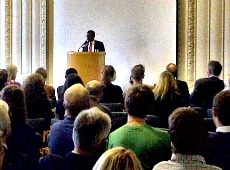The opposition Maldivian Democratic Party (MDP) has pledged to develop a mariculture industry in the country should former President Mohamed Nasheed be reelected in September 2013.
Mariculture is a specialised form of aquaculture which involves the cultivation of marine products such as pearls, oysters, fish and sea cucumbers in the open sea, or in nets or ponds exposed to the sea.
During a function launching the party’s policy on Kendhikulhudhoo island in Noonu Atoll on Saturday, the former president suggested that such an industry could generate US$1.05 billion (MVR 16.19 billion) within five years, should the government be able to successfully run at least 60 mariculture projects throughout the country.
“If we can successfully run 60 projects within five years, we will create 1800 new jobs and the country will receive MVR 16 billion in export revenue,” Nasheed said.
Nasheed claimed the party would establish a soft loan scheme worth MVR 200 million to support the people who wished to become involved in the new industry. He said the MDP hoped to establish mariculture as one of the country’s key industries, alongside fishing and tourism.
The Marine Research Center (MRC) established in the Maldives in the 1980’s has extensively researched the country’s reefs and lagoons and identified several ways in which mariculture activities could be carried out, Nasheed noted.
“What we have learned from this research is that mariculture is a very viable industry that could reap a lot of benefit to the country,” he said.
According to the MRC’s website, current aquaculture products farmed in the Maldives include grouper, sea-cucumber and pearls.
The MRC noted that the first pearl culture activity occurred with financial assistance from the United Nations Development Programme (UNDP) in 1996. When the five year project ended, MRC and the UNDP carried out a follow-up five year project from 2003 to 2008.
During a function to launch a sea cucumber development project on the same island in 2011, Nasheed – then President – elaborated that aquaculture and mariculture projects in the Maldives would ensure “the economic growth and economic viability of the society”.
Nasheed, who partook in a sea cucumber hunt during the event, also claimed at the time that it was beneficial for the country utilise the commercial benefits of marine resources in order to “achieve means of income other than revenues gained from the tourism industry”.
Speaking during Saturday’s function, Nasheed highlighted that while successful mariculture projects had been carried out during the three years of his government, a lack of technical expertise in the field was a key challenge for the expansion of such an industry.
A future government led by the MDP would open higher education opportunities in the country in collaboration with the Maldives National University (MNU), he said.
Eco-education
In 2011 during Nasheed’s presidency the MNU began offering courses in environment management – the first higher education program focused on environmental consolidation in the country – with levels varying from bachelors degree, advanced diploma, diploma and degree foundations.
In a bid to encourage people to take up the program, then Ministry of Environment and Energy also opened full scholarship opportunities to those who wished to take up the course.
Nasheed, speaking of the challenges involved in establishing a mariculture industry, said the lack of a hatchery to produce fish-feed was a key challenge.
Others included difficulties with transportation and logistics, which he said could be resolved by enhancing the transportation system established during the last three years of his presidency, would resolve the issue.
“Attention must be given to the environment surrounding us when we carry out any type of business and we should not obstruct the natural life surrounding us while carrying out any business,” he said
Nasheed also promised to establish both quarantine facilities and research facilities that will monitor and evaluate the businesses and would utilise the existing Maldives Food and Drug Authority (MFDA) to ensure the products produced by the industry met the necessary standards.
“Everything we do should be carried out in a sustainable way. MDP will seek to maintain the mariculture industry in a sustainable manner and that businesses involving mariculture will be properly monitored and evaluated,” he said.
Large-scale mariculture not viable; “Fish feed doesn’t grow on trees,” says DRP
Deputy Leader of the government-aligned DRP, Ahmed ‘Mavota’ Shareef, questioned the viability of introducing large-scale mariculture to the Maldives, and slammed the MDP’s economic predictions as inaccurate and an election ploy.
Shareef told Minivan News that when considering the huge investment costs required for mari-culture, funding would be better spent on providing technologies and know how into expanding industrial fishing in the Maldives.
“As opposed to mariculture, which needs large amounts of capital investment, it is much easier to go out and catch fish,” he claimed. “Tuna here is easy and cheap to catch, all people need is a boat. With freshly-caught fish you will get a much higher price than for mariculture.”
As a comparison, Shareef argued that massive amounts of bait and feed would be required to support the MDP’s predictions of a mariculture industry that would generate just over a billion US dollars in revenue over a five year period.
“The availability of fish feed will be a major issue. It does not just grow on trees,” he added.
Shareef also claimed that the mariculture sector was presently dominated by India, China and the US, mainly based around shellfish. However, he argued that mariculture represented just a small proportion of total global fisheries industry.
Shareeef said the DRP would instead favour boosting resources available to the country’s fishermen through supplying bait, satellite communications equipment, longer lines and focusing on forming cooperative fishing companies to boost catches and help establish large-scale industrial fishing.
Responding to Shareef’s remarks, former Press Secretary during Nasheed’s presidency Mohamed Zuhair dismissed claims that the MDP’s predictions were an election ploy, insisting the party had extensively studied the subject.
“The DRP is entitled to their own views. But I don’t believe they have studied the matter that is being discussed. Our predictions are based on extensive research study. The Maldives has previously tested and tried mariculture and the results are promising,” he said.
Zuhair also claimed the MRC had promoted many opportunities in the field of mariculture during former President Maumoon Abdul Gayoom’s government, but these had not progressed because of a lack of incentives from the central government.
“Each of our islands has direct access to the sea and can easily engage with mariculture. This is not something new to the Maldives; it is tried and tested,” Zuhair said.

